News and Announcements
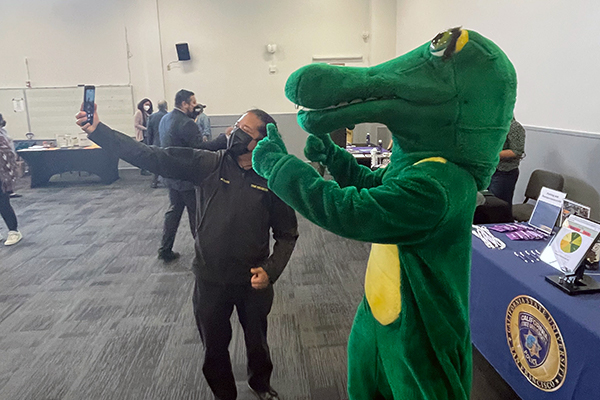
The campus community is invited to SF State’s University Opening Convocation, Thursday, Aug. 17. The event will begin with coffee and pastries at 8:15 a.m. at the Holloway entrance to Creative Arts. Hear campus leaders introduce new community members and highlight campus plans and accomplishments in McKenna Theatre beginning at 9 a.m., followed by an all-campus Resource Fair with refreshments, conversation and information tables from campus programs, offices and various groups on the Fine Arts Patio. The event will end by 12:30 p.m. Come learn about your University, see friends and meet new colleagues.
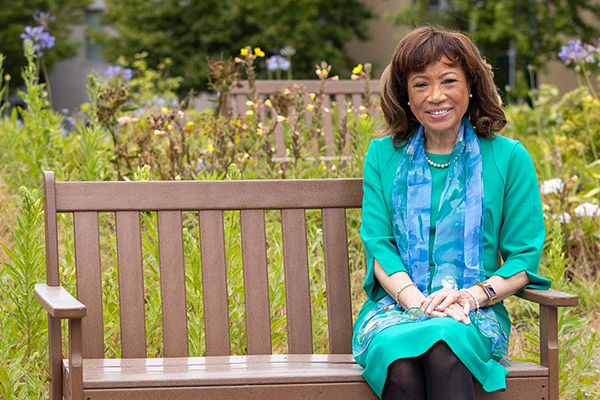
Professor Diane Harris is the newly appointed assistant dean for the College of Science & Engineering (CoSE), tasked with institutionalizing an anti-racist multicultural community within the college. The inspiration for the position began in 2020 when CoSE issued a statement of solidarity with the Black Lives Matter movement after the murder of George Floyd and others, such as Breonna Taylor and Ahmaud Arbery.
“We must honor those who sacrificed their lives. Although we continue to experience the trauma of racism, we must commit to confronting racism and to stopping its violence and destruction,” Harris noted. “More than likely, because of its ingrained historic and continuous perpetuation, we will not eradicate racism in its entirety — however, we have a choice. We can sit back and do nothing and let this racist destruction continue or we can actively do something by creating an anti-racist community within CoSE.”
As assistant dean, Harris is tasked with implementing the goals and objectives of the Strategic Action Plan developed by the CoSE Anti-Racism Task Force and completed in August 2022. Harris credits CoSE Dean Carmen Domingo for starting CoSE’s initial conversations and coordinating community commitment three years ago. One of Assistant Dean Harris’ tasks, in collaboration with Dean Domingo and members of CoSE, is to create an Anti-Racism Committee (ARC). Harris will work closely with ARC — which will be comprised of faculty, staff and students representing multicultural communities — to meet the Strategic Action Plan’s short- and long-term goals and accountability benchmarks for dismantling racist structures and building new structures of multiculturalism, inclusion, equity and anti-racism within the college.
Among the overarching goals of the Strategic Action Plan is the goal of assessing the racial climate that CoSE students, faculty and staff experience in their academic endeavors. Although eradicating racism is a worthy goal, Harris knows it’s a lofty one and she points out that this work is very complex.
“We will be constantly evaluating our policies and practices to discern whether or not they are effective in allowing us to change the existing racial climate to an inclusive and equitable community of multiculturalism,” she explained. This process requires commitment from faculty, staff and students, as well as time, effort and resources to facilitate the building of an anti-racism, multicultural community.
Another goal of the CoSE Strategic Action Plan aligns with the commitment across SF State and the CSU system to generate a climate of anti-racism through social justice for diversity, inclusion and equity. Building partnerships between CoSE and other colleges throughout the SF State community will advance social justice, create a climate of anti-racism and produce a community of multiculturalism, inclusion and equity across campus.
The work toward achieving the intended goals for creating a multicultural, inclusive and equitable community is intensive and requires experience. Harris has plenty of experience with the community at SF State based on both her childhood and professional experiences.
“I think all of this really started with my mother,” Harris said. Her mother worked full time while attending some classes at SF State and later became a longtime credentialed teacher for the Berkeley Unified School District. Harris recalls accompanying her mother to class as a child and often waited in the library while her mother attended class. She marveled at the librarians’ kindness (and patience) and fondly recalls pretending to be a college student. These experiences and the support from her family inspired Harris to pursue her education and to become a licensed psychologist, credentialed school psychologist and SF State professor. Harris never forgot those early SF State memories and deeply cherishes them.
In the Psychology Department, Harris has been the graduate coordinator for the school psychology concentration, taught and trained graduate students in the clinical psychology concentration and taught clinical psychology courses to undergraduate students prior to her recent appointment as assistant dean. Her research has focused on the development of eating disorders within communities of color. Harris’ commitment to service is evidenced by many positions of leadership in professional and civic organizations at local and national levels, and at SF State she has participated and held leadership positions in numerous on-campus service committees.
Harris also has served as one of the co-principal investigators for the NSF Advance IT Catalyst and a co-investigative team member for the NSF Transforms grant. These grants aim to examine the institutional policies and practices and transform the climate at SF State to an inclusive and supportive environment for the advancement of faculty women, especially women of color, in the academic STEM-related professions.
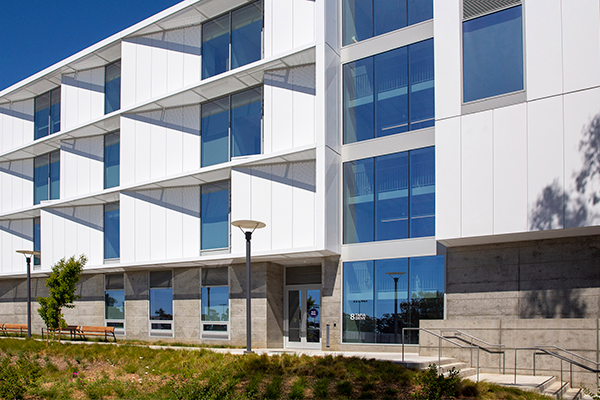
SF State’s George and Judy Marcus Hall for the Liberal and Creative Arts, which first opened in fall 2021, has earned LEED Gold certification.
LEED (Leadership in Energy and Environmental Design), developed by the U.S. Green Building Council (USGBC), is the most widely used green building rating system in the world. Through design and construction that improve environmental and human health, LEED-certified buildings help make the world more sustainable.
“It is a great honor for the University to receive LEED Gold certification for Marcus Hall. At their best, our buildings are an expression of our values as a campus community,” SF State Vice President of University Enterprises Jason Porth said. “Obtaining LEED Gold certification demonstrates our commitment to sustainable design, construction and operations, as well as providing our students, staff and faculty with vibrant, healthy and engaging places to learn, teach, research and create.”
Marcus Hall achieved LEED Gold certification for implementing practical and measurable strategies and solutions in areas including sustainable site development, water savings, energy efficiency, materials selection and indoor environmental quality. The certification reflects the University’s commitment to creating a healthier environment where students and employees can thrive. Key focal points and strategies used to achieve this certification include:
- Marcus Hall was designed in accordance with SF State’s commitment to resilient and sustainable development
- The building was constructed with recycled, renewable and durable materials
- The facility is also efficiently planned to maximize energy performance, balance heat gain and loss, induce natural ventilation and modulate solar exposure
- The landscape design minimizes maintenance by including native, drought-tolerant and well-adapted plant material to reduce water use
Marcus Hall was designed by the renowned architecture firm Mark Cavagnero Associates. The building is named after SF State alumni George Marcus and Judy Marcus, who donated the largest gift ever to the University.
On July 17, University President Lynn Mahoney sent a message to the campus community about the California State University (CSU) Systemwide Title IX and DHR Assessment completed by Cozen O’Connor law firm. “Cozen O’Connor law firm has completed its assessment of how the CSU and its campuses respond to reports and incidents of discrimination and harassment. Through a series of interviews, campus visits, survey results and email feedback, they have identified core observations for improvements at both the system and campus levels. The recommendations from this assessment will guide and help us improve our Title IX and Discrimination, Harassment and Retaliation (DHR) training, awareness, prevention, intervention, compliance and support systems,” wrote Mahoney.
The full report of the systemwide Cozen assessment, including a summary report and a San Francisco State-specific report, can be found on the CSU’s Commitment to Change and SF State Title IX websites.
The most common requests received in Human Resources are right at your fingertips! To access your direct-deposit pay warrants or W2s anytime, use Cal Employee Connect (CEC). For changes to your name, address, withholding, etc., use the Employee Action Request (EAR) Form in Docusign. Working hybrid? Don’t forget to keep your Telework Agreement updated. Your Benefits Open Enrollment time is coming on Sept. 18 – Oct. 13 so reach out to Benefits with any questions at benefits@sfsu.edu. Find all you need on our Human Resources website anytime.
Students, staff and faculty are invited to meet with Provost Amy Sueyoshi during her open office hours. Meetings will occur 8 – 9 a.m. on varying Thursdays through December depending on the provost’s availability.
Please reserve your time to discuss any topics. All meetings will be at the Provost’s Office in Administration 455. Reserve your meeting via Qualtrics. Breakfast refreshments will be provided.
Jamillah Moore, vice president of student affairs and enrollment management, is happy to share office hours for the fall semester. Faculty, students and staff who would like to request a 15-minute meeting with the vice president may fill out the Qualtrics survey with their name, email and a summary of what they would like to discuss.
Employees who take public transportation to work are eligible for the Commuter Check program. This program allows eligible employees to set aside pretax dollars through monthly payroll deduction to cover commuting costs. By participating in this program, employees are able to save money on their daily commute. For more information, please visit the Commuter Check page.
Employees who drive to campus may enroll in the pretax parking plan by purchasing a parking permit through monthly payroll deduction. Once enrolled, the monthly parking permit fee is deducted pretax and renews automatically annually. For more information, please visit the Virtual Parking Permits page.
Hiring students for the school year? Remember, students may not begin work until after their I-9 Verification has been completed — all verifications must now be done in-person. When a student accepts a position, it is important that departments and units first check the student’s service indicators in Campus Solutions to see if they are already I-9 verified. If the student is not already I-9 verified, then the student should request an appointment for I-9 verification to Student_i-9@sfsu.edu or by calling the campus Livescan Front Desk at (415) 405-3808. The student will be sent a link to set up their Tracker I-9 account and given updated instructions on where and when they can bring their documents to show in person.
For I-9 verification, students must present identification documents in accordance with the U.S. Customs and Immigration Services’ list of acceptable documents. All documents must be unexpired and presented in person at the Parking and Transportation Office, located on North State Drive (no photocopies or pictures of documents). International students must first visit the Office of International Programs to begin their I-9 verification process.
Campus jobs for students are posted on Handshake. Check out the Student Employment Hiring Checklist available in the Student Employment Manager Toolkit to help guide a successful hiring process. For more information about the I-9 verification process, please email Student_i-9@sfsu.edu or call the Livescan Front Desk at (415) 405-3808.
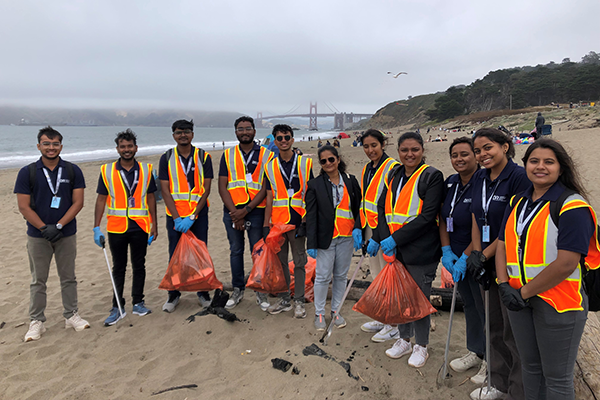
On July 23, 15 College of Professional and Global Education (CPaGE) students from various programs and nationalities attended a volunteer cleanup at Baker Beach with their program adviser and a visiting faculty member from Kadi Sarva Vishwavidyalaya University in India.
The students were enthusiastic about participating in this service activity alongside local SF State residents. The local group organizers provided materials such as trash bags, gloves and trash pickers. The group spent about an hour and a half combing the beach for refuse and managed to fill up a full bag for each person in attendance. The heavy fog of July in San Francisco kept the weather cool, but the students could still catch a glimpse of the lower half of the Golden Gate Bridge. The cleanup organizers commented that they had never before had a group of this size with so many dedicated volunteers.
CPaGE strives to provide international students with experiential and service learning opportunities to complement their classroom learning. CPaGE is planning to organize beach cleanups on a regular basis and welcomes any campus community members to join.
A group of 17 international students from College of Professional & Global Education (CPaGE) summer programs had an enriching experience filled with outdoor activities and camaraderie at the Sierra Nevada Field Campus (SNFC) July 21 – 23. CPaGE collaborated with the College of Science & Engineering (CoSE) to offer a pilot Weekend Camping Trip. Led by two CPaGE program leaders, the students from South Korea, Taiwan and Hong Kong took in the natural beauty of the Sierra Valley with camping, hiking, swimming in lakes, and visiting Downieville and the Kentucky Mine Historic Park and Museum. An astronomy lesson, with turns at the telescope, led by SNFC instructor Martin Sirk was a highlight, as was roasting s'mores under the night skies. It was a memorable weekend of adventure, learning, communing with nature and forging new friendships.
This trip stemmed from discussions between CPaGE and CoSE leadership on ways to expand experiential learning opportunities and SNFC utilization. With excellent ratings and feedback from this year’s participants, CPaGE and SNFC will continue collaborating on the program and plan to make this an annual summer camping trip for future CPaGE international students. A huge thank you to CoSE for all of your support!
The University Budget Committee (UBC) invites you to attend its next meeting, via Zoom, on Thursday, Aug. 31, from 10 a.m. to noon. All campus members are welcome.
Agenda items typically include a wide range of finance-related topics that affect every part of campus operations. Members of the UBC are staff, faculty, students and administrators.
UBC members offer “office hours” on Fridays via Zoom after the monthly meetings to share feedback or ask questions about university budget-related matters heard at meetings. RSVP for the meeting in advance.
A Discover SF State Open House will be held on Saturday, Oct. 21, 9 a.m. to noon. This University-wide event is geared toward encouraging prospective high school and community college students to apply for fall 2024 admission, as well for the campus community to provide a sneak peek of all that we have to offer to students and their loved ones!
Ambassador opportunities will be announced soon. Please consider serving as a University ambassador to assist colleagues in making this a great experience for our guests and a great success for SF State!
Each weekday the Office of Strategic Marketing and Communications compiles a list of news mentions of SF State and distributes it via email to University leadership and various members of the campus community. Everyone is welcome to be included on this distribution list. If you are interested, please email marcomm@sfsu.edu. You can also view University news coverage on SF State in the News.
Beginning fall 2023, Canvas will be the only learning management platform offered on campus. This follows a yearlong transition that began in summer 2022. All fall 2023 courses are available in Canvas, and iLearn will no longer be available for teaching.
Faculty still migrating their content from iLearn io Canvas will continue to have access to two years of past course material in iLearn. Please visit the SF State Canvas website for a detailed timeline on when iLearn is going away completely.
Need help transitioning your course or have general questions about Canvas? Academic Technology is here to help. Visit the Canvas page on the Academic Technology website for a full list of workshops and training opportunities, a link to book a one-on-one appointment with a Canvas specialist, and links to support guides and documentation. Choose an online training offering to fit your schedule, or attend in-person on Thursday, Aug. 17, from 2 to 3 p.m. Registration required.
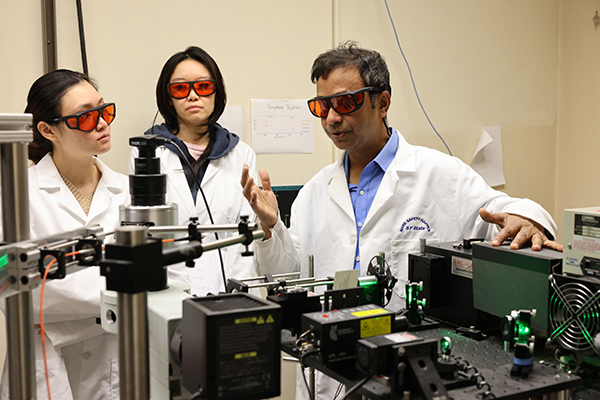
Physics and Astronomy Associate Professor AKM Newaz died unexpectedly in his sleep on July 19. He was a world-leading expert in the experimental characterization of the electrical, thermal and optical properties of two-dimensional quantum materials and he held multiple patents for novel quantum nanodevices. Since joining SF State in 2014, he maintained an active research lab with SF State undergraduate and graduate researchers. The group studied the electronic, optical and electro-optical properties of nanoscale devices made from materials that are only atoms thick.
Newaz earned his Ph.D. in Physics from Stony Brook University and did postdoctoral work at Washington University in St. Louis and Vanderbilt University.
“Newaz was a thoughtful teacher of undergraduate and graduate physics. But more importantly, he was a dedicated research mentor to dozens of student scientists,” said Physics and Astronomy Chair Joseph Barranco. “This legacy will live on in the lives he touched and we miss him dearly.”
Newaz is survived by his wife Homaira Ahmed, daughter Auhona and son Reehan. They were most happy out in nature together, frequently taking family trips to national monuments and parks, and going hiking, camping and fishing. A GoFundMe fundraiser has been established to support the family.
The department plans to have a memorial service in the fall semester.
SF State Spotlight
A KGO-TV segment on July 18 covered an outreach visit to SF State by dozens of San Francisco high school students entering their fourth year. The College Opportunities Summit, presented with 10,000 Degrees, featured seminars helping students tackle college-related concerns, understand the admissions process and gain the tools and skills needed to succeed and graduate.
SF State President Lynn Mahoney presented the keynote. Other speakers included Assistant Director of Undergraduate Admissions and Recruitment Eurania Lopez.
“San Francisco State has a history of social justice,” Lopez said. “And social justice through education is the best way that we can put our works to practice.”
Anthropology Professor Dawn-Elissa Fischer, Africana Studies Lecturer Dave “Davey D” Cook and Michael J. Payton (B.A., ’15) hosted a special advance screening of “I’m a Virgo” on June 14 at the Roxie Theater in San Francisco.
SF State alumnus Boots Riley is the writer and director of “I’m a Virgo,” the critically acclaimed Amazon Prime series about a 13-foot-tall young Black man in Oakland. The New York Times writes: “Boots Riley’s surreal satire about a teenage giant and an authoritarian superhero is a larger-than-life achievement.”
Associate Professor of American Indian Studies Robert Keith Collins was invited by faculty of the Institute for Ethnology at Goethe University, Frankfurt am Main, to give a lecture on July 13 at the Colloquium Americanum 2023. The title of Collins’ lecture is “The Relevance of Native America to Black History.”
This invited lecture discusses what happens when museum anthropologists, curators and Native American and non-Native American community members, artists, anthropologists, cultural experts and scholars come together, use local knowledge to address community critique, and create an exhibit that tells the shared history of Chicago’s founding couple. The small exhibit on Kitihawa (Potawatomi) and Jean Baptiste Pointe Du Sable in the new Field Museum Exhibit, “Native Truths: Our Voices, Our Stories,” was developed out of critical collaborative conversations on the dynamic contributions of Native Americans to the city of Chicago over time, with the goal of addressing community critique that Native American voices have never been the central focus of Field Museum exhibits. This lack of centering lent the illusion that Native Chicagoans and their ancestors have been passive recipients of city formation, rather than active participants, whose ancestors laid the trade frameworks for which the city is renowned.
The lecture also established a shared pedagogical framework for the teaching of Collins’ “Black Indians in the Americas” course by anthropologist Markus Lindner at Goethe University this fall.
Collins and Markus Lindner (Goethe University) chaired the panel, “Unshadowing Effective Museum Collaborations with American Indians: International Paradigms and Perspectives” on June 28 at the American Indian Workshop on “Ancestral Shadows: Ethnocultural encounters carried in body and mind” in Budapest, Hungary. This panel served as a primer for an edited volume currently in preparation.
An Aug. 4 story on KQED outlines the ongoing harmful algal bloom species that is flourishing in San Francisco Bay. This is the same phytoplankton species — Heterosigma akashiwo — a raphidophyte that formed the master’s research and two peer-reviewed articles published by two former graduate students of the Estuary and Ocean Science Center. It is the algal species first identified by Biology Professor Emeritus William Cochlan’s research group in 2002.
This flagellated phytoplankton formed a massive bloom in San Francisco Bay last year, causing thousands of fish to die. The fact that the bloom is occurring again this year is not surprising to Cochlan, as this species forms a resilient stage called a “cyst” that sinks to the seafloor when stressed and waits until environmental conditions are optimal for it to excyst and start growing again — “much like a seed.” The KQED story quotes Cochlan, and much of the text is based on an interview that Cochlan had with the reporter.
Zubaida Qamar, assistant professor of Nutrition and Dietetics, and Jessica Wolin, lecturer of Public Health, attended the CSU Basic Needs Consortium at CSU Long Beach from June 6 to 8. The CSU Basic Needs Consortium is a collective of more than 60 faculty and student researchers across CSU campuses who are engaged in student basic needs research.
Qamar presented her work on a social media campaign to increase awareness of food security resources at SF State. Wolin presented about the College Focused Rapid Rehousing Evaluation, which she leads as co-principal investigator, and about “Student Basic Needs as Student Human Rights.”
Valerie Francisco-Menchavez, College of Health and Social Sciences assistant dean for restorative and transformative racial justice, recently participated in a symposium with cross-border Filipinx diasporic scholars. The symposium kicked off on June 6 with a virtual event, “Multidirectional and Intergenerational Care: Perspectives from the Filipinx Diaspora in the U.S. and Canada.” This roundtable built directly on the main arguments and concepts of Francisco-Menchavez’s first book, “The Labor of Care.”
The panel was funded by the Social Sciences and Humanities Research Council of Canada and the Bulosan Center for Filipinx American Studies at UC Davis.
Kinesiology Professor Maria J. Veri appeared on “Edge of Sports with Dave Zirin” on The Real News Network on June 28. They discussed the gendered politics of tailgate culture and her co-written book, “Gridiron Gourmet: Gender and Food at the Football Tailgate” (University of Arkansas Press, 2019).
On June 19, KQED-FM interviewed Veri about the Oakland A’s moving to Las Vegas, the legacy of the Raiders and her essay, “Sons of Oakland: The Raiders and the Raz/Rais(ing) of a City” (The essay appears in the award-winning anthology “San Francisco Bay Area Sports: Golden Gate Athletics, Recreation and Community,” from University of Arkansas Press in 2017).
Veri co-moderated a panel, “Dance like No One is Watching: An Oral History of the Amy Morris Homans Cotillion (1982 – 2014),” at the North American Society for Sport History Annual Convention, held May 26 – May 29 in Washington, D.C. The Amy Morris Homans Cotillion was created as a safe space for lesbian women to connect and create joyful sisterhood with long lasting professional and personal relationships within the homophobic space of the American Alliance for Health, Physical Education, Recreation and Dance. Held annually from 1982 to 2014, this underground social event gathered hundreds of women at its peak, inviting them to drink, dance and dream of a better world. The panelists, including Kinesiology Professor Emerita Bobby Bennett, shared origin stories and reflected on the meanings of their experiences, social changes influenced by the Cotillion crowd and issues that remain in creating inclusive academic, professional and social communities.
In addition, Veri presented at the Association for the Study of Food in Society Conference, held in Boston May 31 – June 3. She discussed her research on how the American dairy industry aligns itself with popular notions of sport, athleticism and nationalism in order to promote milk drinking in the United States. The talk, titled “Milk for Every Body?: Gender, Race and Sport Representation in mid-20th Century U.S. Dairy Promotions,” was part of a panel focused on investigating intersections between food studies and sport studies. Papers from this panel will be included in Verdi’s forthcoming edited anthology “Setting the Table: Essays at the Intersection of Sport and Food” (University of Arkansas Press).
Recreation, Parks and Tourism Professor Erik Peper’s recent articles include:
- “Reflections on the increase in autism, ADHD, anxiety and depression: Part 1 – bonding, screen time and circadian rhythms” in NeuroRegulation on June 29
- “Transforming a ‘bad eye’ to an ‘amazing eye’: a case report and protocol” with Dana Yirmiyahu in Townsend Letter on July 29
- “TechStress: Building Healthier Computer Habits” with Recreation, Parks and Tourism Professor Richard Harvey and Nancy Faass in Well Being Journal in fall 2023
Is it worth it to wake up early for a workout before sunrise? Kinesiology Professor Matthew Lee appeared on ABC’s “Good Morning America” on July 18 to evaluate the best time of the day to exercise. Reporter Becky Worley visited Lee in the SF State Kinesiology Department, where she exercised on a stationary bicycle in the morning and afternoon, wearing a mask that tracks her carbon dioxide output.
“You may burn a little more fat in the morning just due to potentially being in a fasted state versus afternoon, but as far as caloric expenditure doesn’t make that much of a difference,” Lee said.